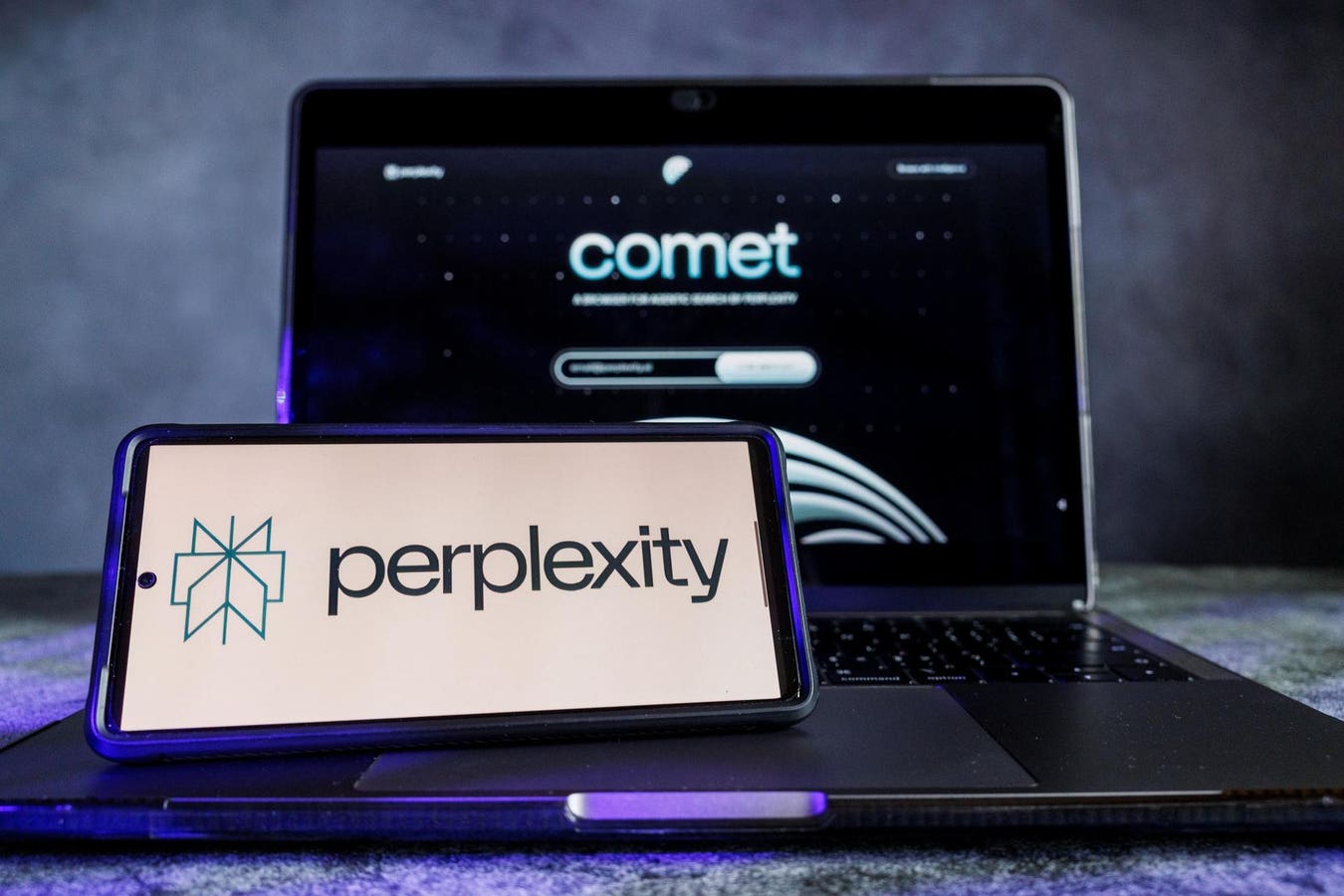The AI browser revolution has arrived: Perplexity’s Comet and OpenAI’s upcoming launch mark the … More
When Perplexity launched its Comet AI browser this week, it wasn’t just releasing another Google Chrome competitor. It was igniting the next big wave in the AI era – agentic applications. Within hours, Reuters confirmed that OpenAI is launching its own AI-powered browser “in the coming weeks,” validating Perplexity’s bet that the future belongs to applications that think, plan, and act autonomously on behalf of users.
To be clear, this isn’t just about browsers. Perplexity’s Comet represents the emergence of agentic applications that rebuild entire workflows around AI capabilities rather than simply adding AI features to existing products. While traditional companies bolt chatbots onto websites or AI search into browsers, agentic applications like Comet are built AI-first, enabling autonomous agents that anticipate needs, complete complex tasks, and deliver outcomes rather than just responses.
When a billion-dollar startup like Perplexity launches an agentic application and OpenAI immediately follows with its own version, it signals more than browser competition – it’s the beginning of a fundamental shift toward AI-native experiences across every industry. The question for business leaders isn’t whether agentic applications will emerge, but how quickly they can adapt before competitors seize the advantage.
Perplexity’s Comet: the agentic application blueprint
Agentic applications are AI-native software systems that can think, plan, and act autonomously on behalf of users to complete complex, multi-step tasks without constant human intervention. Unlike traditional AI tools that respond to prompts, agentic applications proactively initiate actions, make decisions, and execute workflows independently.
Agentic applications are built from the ground up as AI-first
The secret lies in understanding how AI-native agentic applications differ fundamentally from AI-enhanced products. Traditional software companies bolt AI features onto existing workflows – adding chatbots to websites or AI search to browsers. Agentic applications rebuild entire workflows around AI capabilities, enabling autonomous task completion that transforms user experiences entirely.
Perplexity’s Comet browser exemplifies this approach. Rather than simply adding AI search to traditional browsing, Comet integrates the Comet Assistant – an AI agent that lives in a sidebar and can see and understand the content of any active webpage. This allows users to ask questions about YouTube videos, analyze text in Google Docs, or get summaries of articles without switching tabs or copy-pasting information.
The most compelling feature is the sidecar functionality: users can access Comet Assistant by opening a sidebar on any web page, letting the AI agent see what’s on screen and answer questions about it in real-time. Early testing shows this streamlines workflows for users who typically send screenshots, files, and links to ChatGPT throughout the day. The assistant can summarize emails from important senders, analyze social media posts, and even provide calendar management and navigation advice.
An example of Perplexity’s Comet.
However, agentic applications also reveal current AI limitations. When tasked with complex multi-step processes like booking airport parking, Comet Assistant demonstrated the hallucination problems that plague many AI agents – entering wrong dates and trying to complete transactions with incorrect information. These failures echo similar issues with OpenAI’s Operator agent, highlighting that while the agentic approach is promising, current AI technology still struggles with complex, high-stakes tasks.
Perplexity CEO Aravind Srinivas describes Comet as a “cognitive operating system” that powers a shift from “browsing to thinking” by collapsing complex workflows into fluid conversations. According to Perplexity’s blog, the browser removes “the friction of context-switching between dozens of applications” and enables users to “ask questions anywhere they occur, whether to understand complex concepts, find connections, or solve problems.”
Available exclusively to $200/month Max subscribers, Comet employs a sophisticated hybrid AI architecture, combining local processing for basic tasks with cloud-based APIs for more complex operations. The browser prioritizes privacy with data stored locally and includes a native ad blocker, distinguishing it from Chrome’s increasingly restrictive approach to ad blocking.
Yet agentic applications require extensive system access to deliver their autonomous capabilities. To enable calendar management and email integration, Comet Assistant requires significant permissions including viewing screens, sending emails, accessing contacts, and adding calendar events. This raises important privacy considerations for businesses evaluating agentic applications – the more autonomous the AI, the more access it requires to personal and corporate data.
Srinivas explained his vision in March: to “develop an operating system with which you can do almost everything,” enabling Perplexity’s AI to help users across apps and websites. Becoming the default browser could translate to “infinite retention,” leading to more requests on Perplexity and establishing a direct relationship with users without going through Google Chrome.
OpenAI’s browser strategy goes even further, envisioning ChatGPT as “the front end of the web” where most web traffic becomes bot traffic handling errands for human users. The Information reports that OpenAI spent eight months developing this browser after hiring two founding Chrome engineers from Google, signaling serious long-term commitment to reimagining web interaction.
This vision builds on OpenAI’s recently launched Operator, a “computer-using agent” that navigates existing browsers to handle web-based tasks. While early reviews noted technical roughness, controlling the browser natively should dramatically improve agent performance, demonstrating why AI-native applications outperform retrofitted alternatives.
The technical foundation involves OpenAI’s push for widespread adoption of Model Context Protocol, which allows AI agents direct access to website systems. In this future, users won’t navigate websites manually – they’ll tell AI agents what they want to accomplish, and agents will autonomously complete complex multi-step tasks.
Consumer behavior validates the agentic transformation
Menlo Ventures’ 2025 Consumer AI report reveals why Perplexity’s agentic approach is perfectly timed: 61% of U.S. adults have used AI in the past six months, yet only 3% pay for premium services—creating a $432 billion monetization opportunity that traditional web models can’t capture. Companies like Lovable ($50M revenue in 6 months), Cursor ($100M in year one), and Gamma ($50M revenue on <$25M funding) prove that AI-native applications achieve profitability faster than retrofit competitors.
The rise of agentic applications will disrupt traditional enterprise software.
Consumer behavior patterns reveal why agentic applications have massive potential. Writing tasks show 51% AI penetration—the highest of any activity—while creative applications capture 45% of specialized AI tool spending. Perhaps most tellingly, 91% of AI users default to general assistants for nearly every task, revealing massive demand for specialized agents that understand context across sessions.
Perplexity’s Comet demonstrates this shift in practice. The browser’s AI assistant can conduct entire browsing sessions while users focus on what matters, comparing products across different sites, analyzing which retailers ship items faster, or examining content against previously viewed materials. This represents what Perplexity calls a fundamental shift from “navigation to cognition” – transforming how users interact with online content by enabling them to ask questions anywhere they occur.
Microsoft has already begun promoting Natural Language Web technology, with Shopify, Eventbrite, and TripAdvisor implementing customized ChatGPT versions that let visitors use conversational language to search for products and information. This represents the early infrastructure of an AI-mediated web where natural language becomes the primary interface for digital commerce.
From SEO to AEO: optimizing for AI discovery in the agentic era
The rise of agentic applications creates entirely new rules for how businesses reach customers online. Traditional SEO focused on ranking in blue links, but the future belongs to AEO (Answer Engine Optimization), GEO (Generative Engine Optimization), and GSO (Generative Search Optimization) – ensuring AI crawlers can understand and surface your content in synthesized AI responses.
This represents a fundamental shift in content strategy and digital marketing. Traditional search optimization targeted simple keyword queries leading to website clicks. AI engine optimization serves complex “long-tail queries” – lengthy prompts that AI engines answer directly with synthesized responses, often without sending users to external websites.
The challenge is that AI crawlers are still “pretty crude” compared to traditional search engines, according to GroupM’s Edward Cowell. But this creates opportunities for early movers. Businesses can upload raw data to LLMS.txt files (the AI equivalent of robots.txt) to make content more accessible to AI crawlers, or implement OpenAI’s Model Context Protocol for direct agent access to their systems.
SEO professionals are adapting quickly. “Everyone sitting on their hands and doing nothing is not an option,” said Edward Cowell, global VP of Organic Practices at GroupM. The shift requires understanding how AI engines represent brands within generated responses, whether they’re linking back correctly, and ensuring information accuracy.
The AI-native business model revolution
The business case for agentic applications is compelling across industries. AI companies attracted over $100 billion in venture funding in 2024—37% of all VC investment. The global AI market, valued at $279 billion in 2024, is projected to reach $1.81 trillion by 2030. IDC research shows every dollar invested in AI generates $4.9 in economic value, with cumulative global impact expected to reach $22.3 trillion by 2030.
Enterprise adoption validates the agentic approach. Microsoft Azure clients report dramatic results from AI-native strategies: Sync Labs saw 30x revenue growth and 100x customer base expansion. Walmart scaled AI-powered inventory management from 100 stores to worldwide deployment in three years. Lumen reduced sales preparation time from four hours to 15 minutes using Microsoft Copilot, projecting $50 million in annual savings.
McKinsey research shows companies with leading AI capabilities outperform laggards by 2-6x, with average ROI of 4.3% compared to 0.2% for beginners. Payback periods average just 1.2 years for strategic AI investments. The key differentiators: building AI-native workflows rather than retrofitting existing processes.
Building for the agentic future
Forward-thinking businesses are already implementing strategies to succeed in the AI browser era:
Implement AI-accessible APIs: Ensure your systems can interact directly with AI agents through standardized protocols like Model Context Protocol.
Optimize for AI discovery: Create LLMS.txt files, implement structured data markup, and ensure AI crawlers can easily access and understand your content.
Design for conversational queries: Analyze social media conversations and user forums to understand complex questions people ask about your industry, then create content optimized for these nuanced inquiries.
Track agentic metrics: Monitor brand mentions and accuracy within AI responses, not just traditional web analytics.
The companies achieving the highest returns focus on high-frequency, high-friction activities where general AI tools fall short. They build persistent memory and strong integrations rather than standalone features. Most importantly, they deliver experiences that are 10x better than alternatives, not incremental improvements.
Perplexity’s Comet demonstrates this approach in action. Currently available for Windows and macOS with mobile versions planned, the browser offers full support for importing Chrome extensions, bookmarks, and settings in one click, removing friction while maintaining a familiar browsing experience. Built on Chromium, it ensures compatibility with existing Chrome extensions while adding AI-native capabilities that transform basic browsing into cognitive workflows.
Key takeaways for business leaders
Perplexity’s Comet browser launch marks a defining moment in the emergence of agentic applications – AI-native experiences that rebuild workflows around autonomous capabilities rather than retrofitting existing products. When OpenAI immediately follows with its own browser announcement, it validates that this isn’t just a browser war but the beginning of a fundamental platform shift.
Immediate action items for businesses:
- Audit your digital strategy for AI-readiness: Evaluate whether your systems can interact with AI agents, not just human users.
- Implement Answer Engine Optimization (AEO): Move beyond traditional SEO to optimize for AI-powered search and discovery using guidance from industry experts.
- Build API-first architecture: Prepare for a future where most customer interactions happen through AI intermediaries.
- Start with low-risk agentic applications: Deploy AI agents for routine tasks like content summarization and simple workflow automation, while maintaining human oversight for complex, high-stakes processes.
- Develop privacy frameworks for AI access: Establish clear policies for how much system access to grant agentic applications, balancing functionality with security and privacy requirements.
- Track AI mentions and accuracy: Monitor how AI engines represent your brand and ensure information accuracy across all agentic platforms.
The question isn’t whether AI agents will reshape your industry – it’s whether you’ll lead that transformation or be disrupted by it. The agentic revolution is accelerating, and the companies that recognize this shift will capture disproportionate value in the emerging economy.









